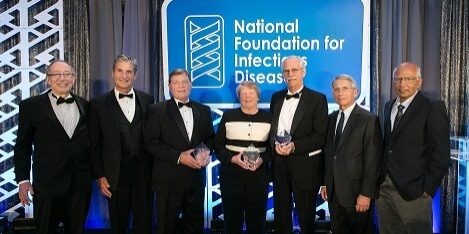
The National Foundation for Infectious Diseases (NFID) recently honored infectious disease heroes for their significant and lasting contributions to global public health at the 2016 NFID Awards Dinner. The 2016 Maxwell Finland Award for Scientific Achievement was presented to Diane E. Griffin, MD, PhD in recognition of her career as a distinguished virologist, renowned for her studies of measles and alphaviruses, as well as her leadership and dedication to mentoring the next generation of infectious disease investigators.
Dr. Griffin’s work has elucidated some of the complex mechanisms involved in infection and immune responses and has forever changed scientific understanding of acute viral infections. Her work, she says, is driven by her fascination with the complexity of the processes that cause disease. She discovered early in her training that she was less interested in pathogens themselves than in how they caused illness. And she was equally interested in the immune response necessary for clinical recovery and virus clearance.
Diane Griffin is an outstanding scientist of enormous stature with an extraordinary record of service to the infectious diseases community.
–Anthony S. Fauci, MD, Director, National Institute of Allergy and Infectious Diseases and recipient of the 1989 Maxwell Finland Award
While her approach to understanding disease processes is highly strategic—examining each step in a disease process methodically and exhaustively—she claims a very different approach to her career path. “I was not strategic in planning my career,” says Dr. Griffin. “I followed my nose and made what I thought were practical decisions along the way.” Among them was the decision to always seek out the best learning environments, surrounding herself by the best scientists possible.
She advises young investigators to do the same. She also counsels them to work on what interests them, to ask important and tough questions, and most importantly, to maintain the highest scientific standards. “Never be deterred by a result you didn’t expect or want,” says Dr. Griffin. “The data are the data—the mission is only to find the scientific truth.” Dr. Griffin’s dedicated mentoring of the next generation of scientists to ask the hard questions will pay dividends well into the future.
A SCIENTIFIC MIND DEVELOPS
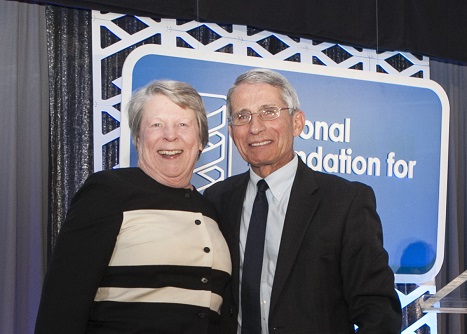 Mary Diane Edmund was born in Iowa City to Doris, an elementary school teacher and Rudolph, a PhD geology student who worked for most of his daughter’s childhood as a petroleum geologist. He also taught geology at Augustana College, a small liberal arts college that was both his and Doris’ alma mater.
Mary Diane Edmund was born in Iowa City to Doris, an elementary school teacher and Rudolph, a PhD geology student who worked for most of his daughter’s childhood as a petroleum geologist. He also taught geology at Augustana College, a small liberal arts college that was both his and Doris’ alma mater.
Teaching was an Edmund family tradition that extended beyond the classrooms where Diane’s parents worked. Family vacations sometimes included the Teton mountain range, the subject of her father’s dissertation, where Diane and her younger sisters were introduced to the science that could be learned from road cuts and hikes in the mountains. Her father’s real loves, she says, were “nature, mountains, and understanding how things worked.” A trait his daughter clearly shares.
Diane and her sisters also enrolled at Augustana College, but only Diane pursued science, majoring in Biology. During her undergraduate work, she developed an interest in microbiology, which she credits to the learning process and exposure to new ideas and people, a theme repeated throughout her training and career.
Her next stop was the microbiology PhD program at Stanford University School of Medicine. Stanford introduced her to new ideas, new people, and new possibilities. She met more women in the sciences and saw them doing things she had not considered. She also met women who stopped short of their dreams—not pursuing an MD because “medicine was not considered a good choice for women.” Early in her first year at Stanford, Diane became interested in the mechanisms microbes use to cause disease, rather than the microbes themselves. The university’s five-year MD program allowed time for research and made it possible to pursue her MD and PhD degrees simultaneously. Medical school fostered her interest specifically in viral infections. A young, now married Dr. Griffin took that interest with her across the country to Johns Hopkins University in 1970, where she has worked since.
HELPING TO DEFINE NEUROVIROLOGY
Dr. Griffin arranged a postdoctoral fellowship with Richard T. Johnson, MD, who is widely credited with inventing the field of neurovirology. His pioneering multidisciplinary approach to understanding viral diseases of the nervous system brought together postdoctoral fellows and junior faculty from virology, immunology, neurology, pathology, veterinary medicine, and eventually, molecular biology. According to Dr. Griffin, he understood, as did she, that expertise in each area was needed to truly understand all the steps in neurologic infection processes.
It was during her postdoctoral fellowship with Dr. Johnson that her interest in the pathogenesis of acute encephalomyelitis caused by alphaviruses and in measles virus took hold. She first focused on how the immune response promotes recovery from Sindbis, an alphavirus that produces encephalomyelitis by infecting neurons, and on identifying the viral and host determinants of its virulence. Studies showed that one consequence of failure to eliminate infected cells is failure to eliminate viral RNA from brain and spinal cord neurons. This RNA persistence leads to the need for long-term suppression of virus replication.
During a 1971 professorial exchange to Lima, Peru, Dr. Johnson saw a large number of cases of post-measles encephalomyelitis, a relatively rare complication that occurs primarily in older children. Investigation revealed that this measles complication is an autoimmune demyelinating disease and a manifestation of the immunologic abnormalities induced by measles virus infection. The most important of these immunologic abnormalities is immune suppression leading to increased susceptibility to other infectious diseases, which accounts for most measles deaths.
Dr. Griffin showed that measles virus-induced immune suppression is paradoxically associated with immune activation, suppression of IL-12 production, and production of cytokines that inhibit macrophage activation during a prolonged period of persistence of peripheral and lymph tissue viral RNA. Infectious measles virus is eliminated rapidly, but clearance of viral RNA takes months and is associated with multiple waves of functionally distinct T cells and slow maturation of antiviral antibody.
“Diane Griffin’s explorations of the molecular processes of the measles virus and the immune components produced by it are truly remarkable.”
–Samuel L. Katz, MD, Wilburt C. Davison Professor and Chair Emeritus, Department of Pediatrics, Duke University School of Medicine and recipient of the 2015 Maxwell Finland Award
Another paradoxical observation during these multifaceted studies of children with measles is that measles virus infection inhibits HIV replication and rapidly lowers HIV viral load. Studies of the efficacy of previous, current, and experimental measles vaccines in nonhuman primates have clarified the determinants of protective immunity. These studies identified the cause of the severe disease atypical measles, which led to withdrawal of the formalin-inactivated vaccine and demonstrated the importance of high avidity neutralizing antibody and T cell-mediated immunity for protection.
COMMITMENT TO THE SCIENTIFIC COMMUNITY
The significance of Dr. Griffin’s scientific contributions is demonstrated by the more than 250 original publications she has authored, her election to the National Academy of Sciences in 2004, and the many awards she has received from her peers and a grateful scientific community. In addition to her original scientific contributions, Dr. Griffin has emerged as one of the leading international virology authorities. She has written more than 140 book chapters and reviews. Since 2001, she has served as an editor of Field’s Virology, the “bible” of virology for infectious disease physicians. Naturally, she also contributed the chapters on alphaviruses and measles.
Dr. Griffin has served on dozens of professional committees and her tireless service has led to her election to many important leadership positions including President of the Immunology Council at Johns Hopkins, the American Society for Virology, the Association of Medical School Microbiology and Immunology Chairs, and the American Society of Microbiology. With this record of service, it was highly appropriate that she was elected Vice President of the National Academy of Sciences in 2013.
Far from being content with all the questions she’s already answered, Dr. Griffin is characteristically focused on the next one: How can you clear a virus from a cell without killing the cell? “Every time you answer a question in science, you get five more,” she says. Fortunately, Dr. Diane Griffin is up to the challenge of continuing to find answers to these questions.
NFID proudly honored 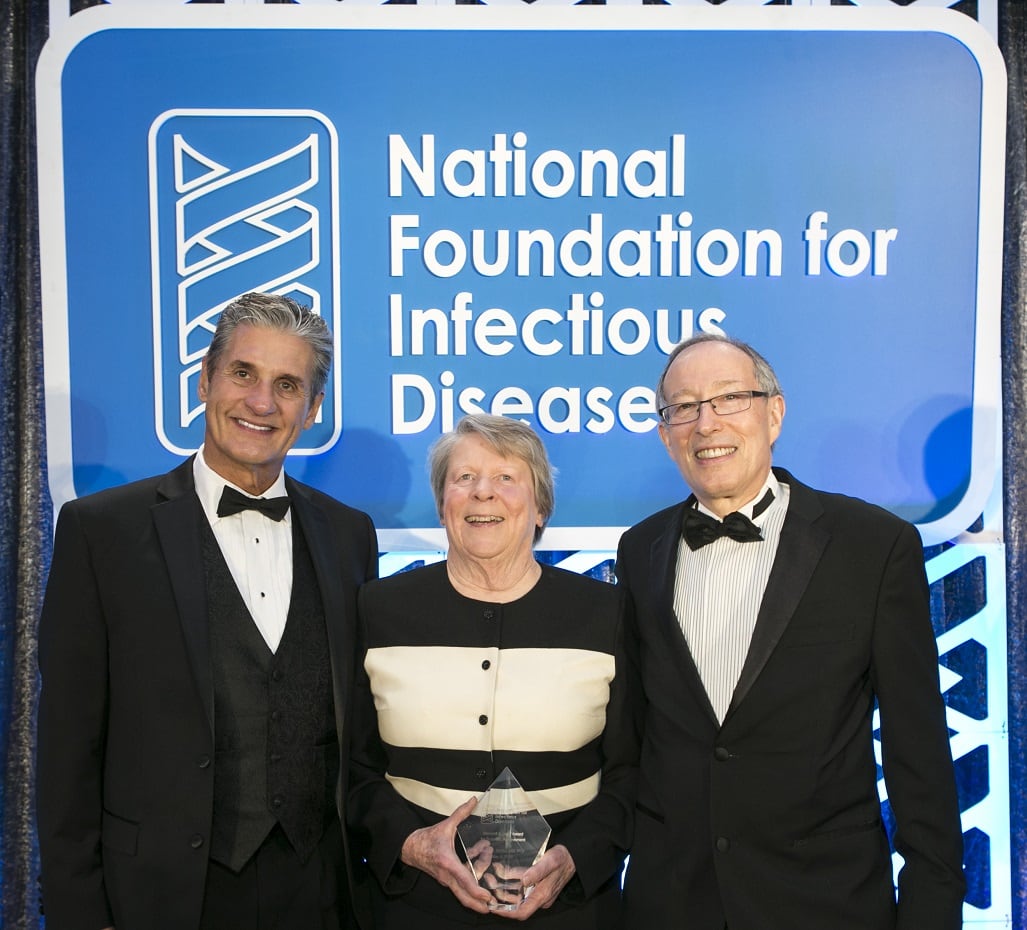 Diane E. Griffin, MD, PhD with the 2016 Maxwell Finland Award for Scientific Achievement for her major scientific contributions, devoted care and mentoring of young scientists, and the towering leadership she has provided to the global infectious disease community.
Diane E. Griffin, MD, PhD with the 2016 Maxwell Finland Award for Scientific Achievement for her major scientific contributions, devoted care and mentoring of young scientists, and the towering leadership she has provided to the global infectious disease community.
View additional photos from the 2016 NFID Awards Dinner
Nominations for the 2017 NFID Awards will be accepted until June 30, 2016. All nominations must be submitted online at: 2017 Awards Nomination. Awards will be presented at a black-tie gala in the Spring of 2017 in the Washington, DC area.
To join the conversation, follow us on Twitter (@nfidvaccines) using the hashtag #NFIDawards, like us on Facebook, join the NFID Linkedin Group, and subscribe to NFID Updates.
Related Posts
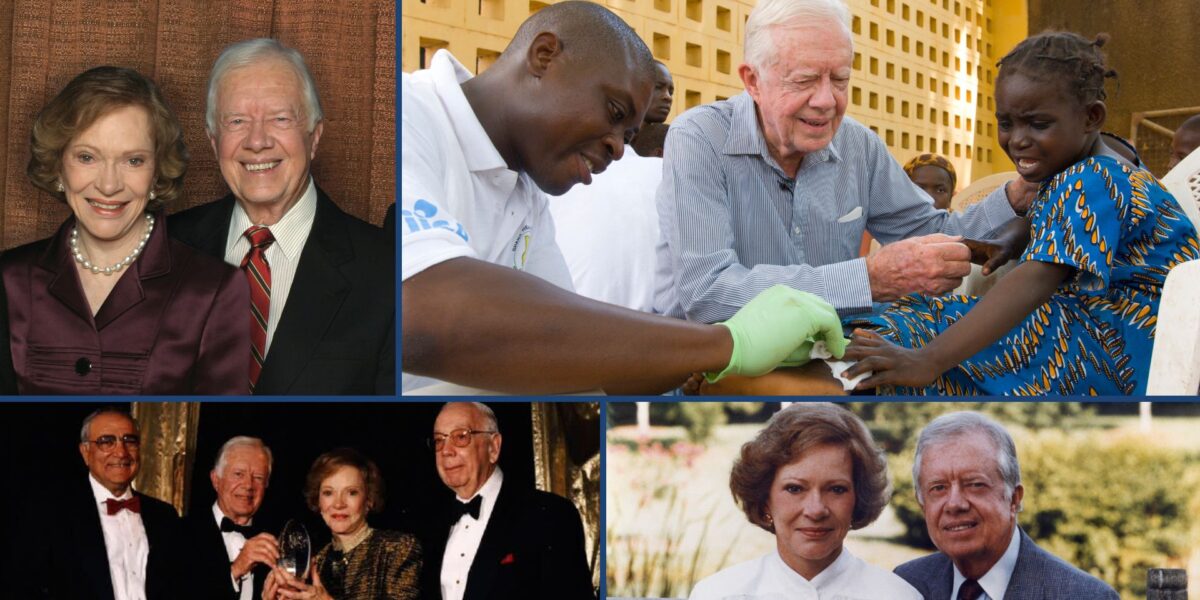
Remembering Jimmy Carter
The annual Jimmy and Rosalynn Carter Humanitarian Award honors the former president’s lifelong commitment to public service and global health
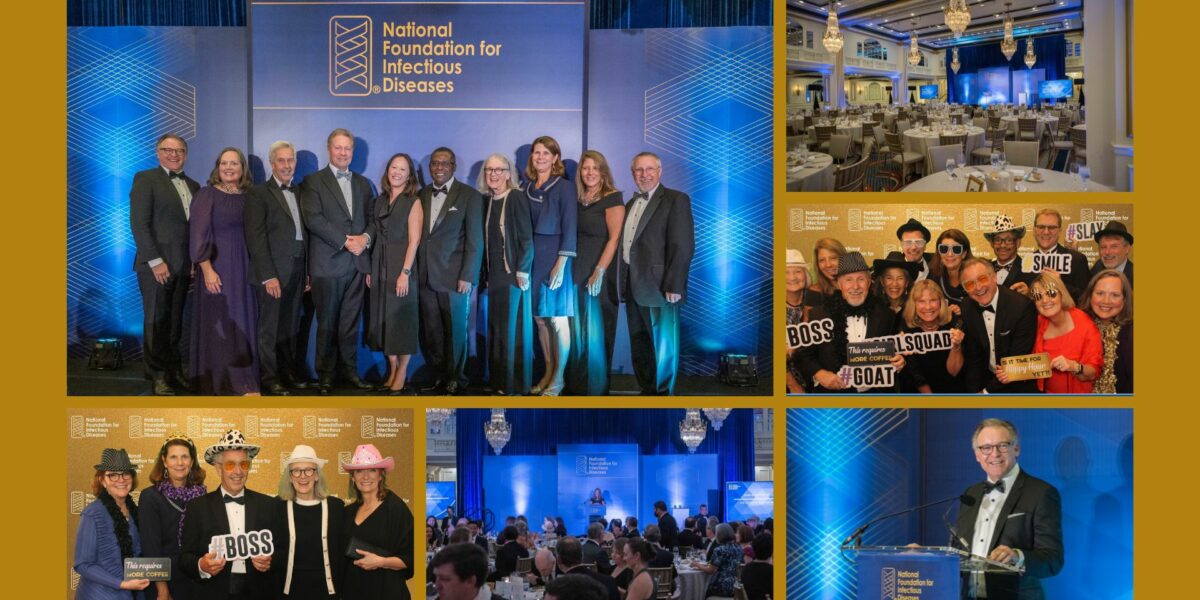
A Star-Studded Celebration of Public Health Heroes
At the 2024 Awards Gala and Silent Auction, the National Foundation for Infectious Diseases (NFID) recognized the inspiring accomplishments of 3 outstanding public health leaders: Seth F. Berkley, MD; Ighovwerha (Igho) Ofotokun, MD, MSc; and Grace M. Lee, MD, MPH …
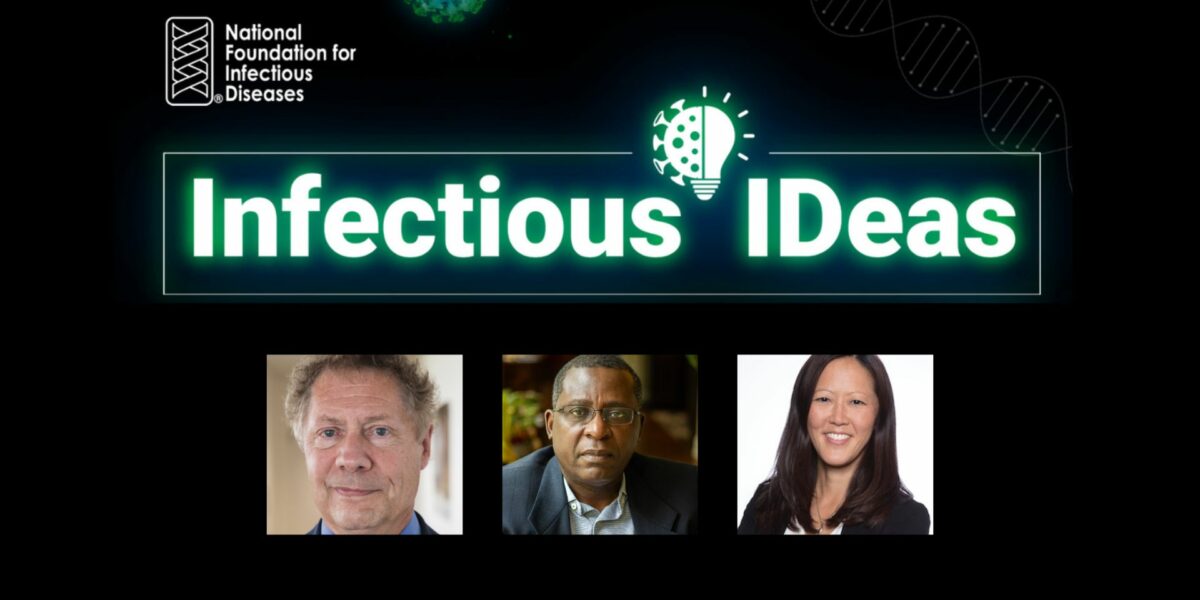
Insights from Inspiring Public Health Heroes
Recipients of the prestigious 2024 NFID awards share their inspiring insights on the NFID podcast, Infectious IDeas …
